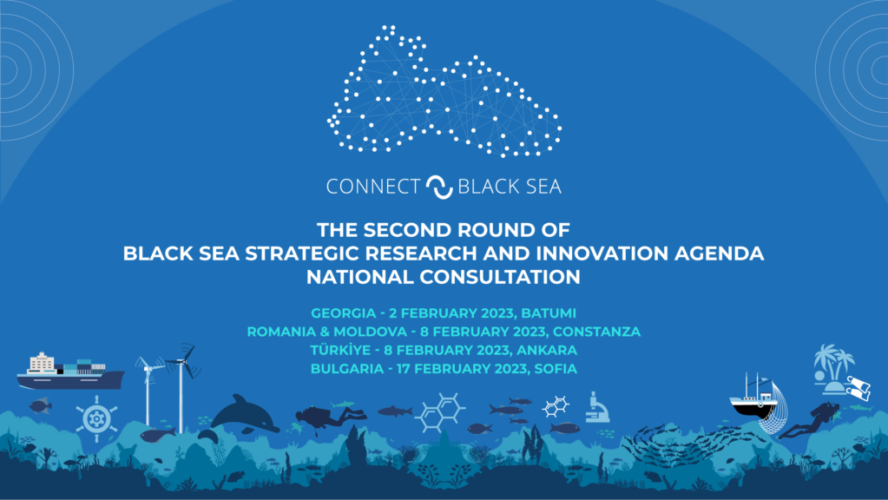The 2nd Round of Black Sea Strategic Research and Innovation Agenda National Consultations on the Implementation Plan Have Started!
With the support of the European Commission, a working group of experts from countries bordering the Black Sea gathered in 2017 to develop a shared agenda for research and innovation for the Black Sea and provide guidance to national and EU policymakers. The group collaborated with marine experts from top European marine institutes and organizations and produced the Burgas Vision Paper, the key framework document for a shared vision of a productive, healthy, resilient, sustainable, and better-valued Black Sea by 2030. The publication was introduced at the 2018 European Maritime Day in Burgas, Bulgaria (May 2018). It addresses the key pillars on which the Black Sea Strategic Research and Innovation Agenda (SRIA) is built on. The Ministerial Declaration towards a Common Maritime Agenda for the Black Sea (2018), endorsed by the same Black Sea countries, provided more backing for this approach. The Horizon 2020 Program provided funding for the “Coordination of Marine and Maritime Research and Innovation in the Black Sea – Black Sea CONNECT” Coordination and Support Action in 2019.
Creating a responsible and effective SRIA Implementation Plan based on the essential framework requirements to translate SRIA outputs into actions in collaboration with national research funders and key stakeholders is one of the goals of the Black Sea CONNECT CSA. In order to do so, national-level SRIA consultations were held in the Black Sea riparian countries in the latter half of 2020. These consultations provided direct input to the SRIA and its Implementation Plan with regard to country-level goals and priorities. In order to ensure the involvement of funding agencies and ministries from Black Sea countries, a network called the Operational Network of Funders has also been established. Its goal is to strengthen regional cooperation among public research funders and facilitate the alignment of national priorities (such as research and innovation strategies) and prepare the ground for the focused funding of joint actions to address the key challenges and goals of the SRIA.
The 1st Draft of the Implementation Plan was developed using input from the Operational Network of Funders in addition to national-level input gathered through the consultations and input from European and regional level priorities and policies like the European Green Deal, Mission Ocean and Waters, Sustainable Blue Economy Partnership, and UN Decade of Ocean Science. Based on this initial draft, the second round of national and SRIA consultations will be held.
The 2nd Round of National SRIA consultations will aim to get national-level input from a broader stakeholder group on the themes and concrete strategic joint (SJAs) actions drafted as an output of the 1st National SRIA Consultations. The participants will be explicitly asked how feasible each SJA is (1st question) and what SJAs are that are not feasible within the existing capacities but necessary to implement (2nd question). They will also be asked for their general feedback on the themes and SJAs of the Implementation Plan. (3rd question). The goal of this exercise is to identify common strategic joint actions that different Black Sea countries find feasible and/or already in the progress of implementing so that synergies among the implementation of these actions can be aligned across different countries.
Based on the 2nd round of consultations, an international-level workshop will take place to complement the national-level input. The results of these workshops will be incorporated into the Final SRIA and its Implementation Plan.
The Final Black Sea SRIA and the Implementation Plan aim to set the foundational work for protecting the unique habitats of the Black Sea while supporting the development of sea-based sectors, which will then boost the blue economy and help create more jobs. The SRIA and its Implementation Plan will direct participants from academia, funding organizations, industry, policy, and society to address the fundamental challenges of the Black Sea, to promote the blue economy, to build vital support systems and innovative research infrastructure, to enhance education, and to build capacity. The Implementation Plan will be a long-lasting guide to catalyse new ideas and innovations.

